November 2, 2025 – Day 3 in Bhutan (Bardo, Komshar, Pantang)
Hello. Today marks the third day of Sunim’s visit to Bhutan. Sunim spent the entire day traveling between villages, attending completion ceremonies, conducting site inspections, and conversing with local residents.
Sunim began his day at 4:45 AM with morning prayers, 108 prostrations, and meditation together with JTS volunteers.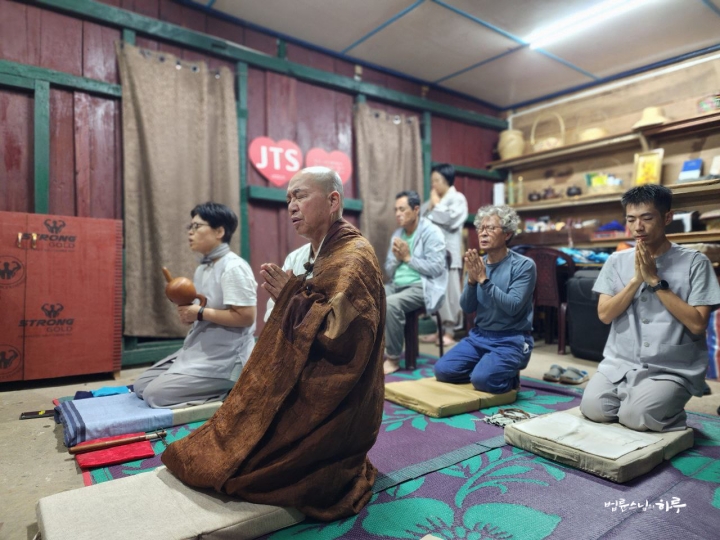
After a simple breakfast, Sunim asked the volunteers who were staying at the JTS center today to prepare a Korean and Indian-style dinner, as he planned to invite the Bhutanese government officials who would be attending the evening completion ceremony.
At 6 AM, Sunim headed to Bardo Chiwog, the first destination of the day. Although the rain had temporarily stopped today, the river water had risen significantly due to three days of continuous rainfall.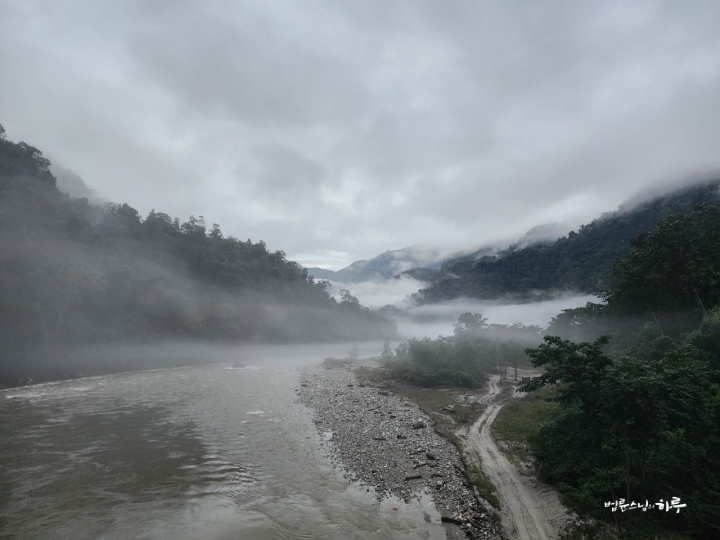
About 30 minutes into the journey, rocks and soil had collapsed from the mountain, blocking the road. After stopping the car and clearing the rocks, they resumed their journey. After driving for 2 hours and 30 minutes, they encountered another rockfall and had to stop the car again. They cleared the rocks and continued on their way.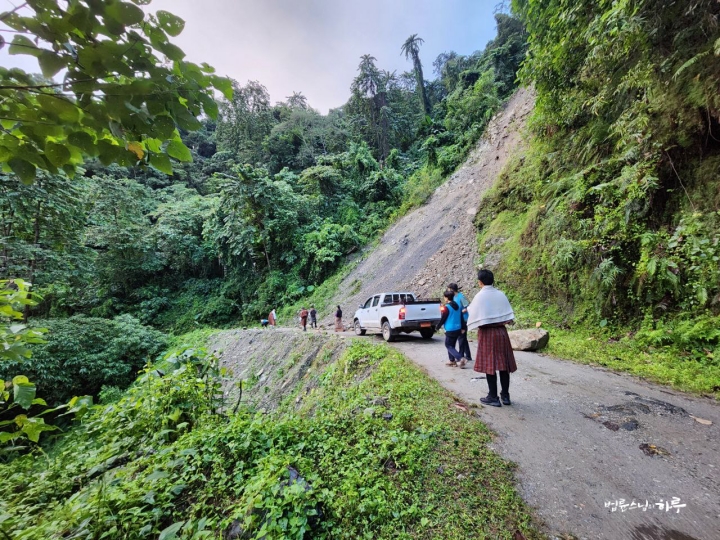
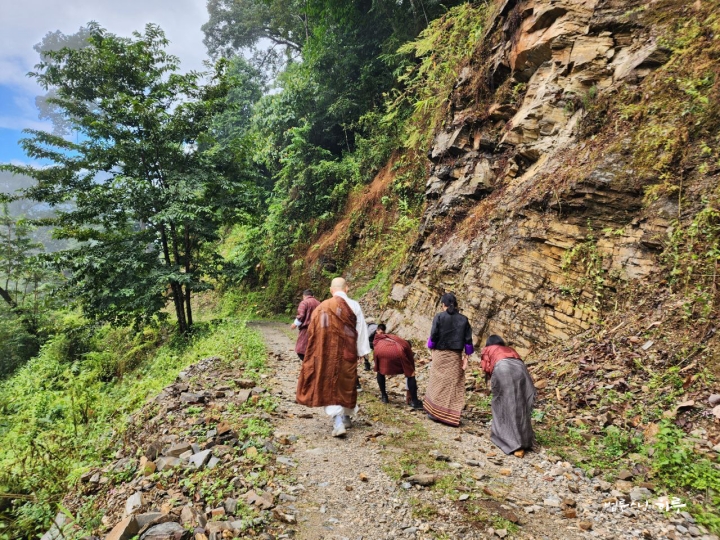
In the distance, the clouds began to clear gradually, and blue sky started to appear along with sunshine. As light rain fell, a rainbow rose from the valley and hung over the forest.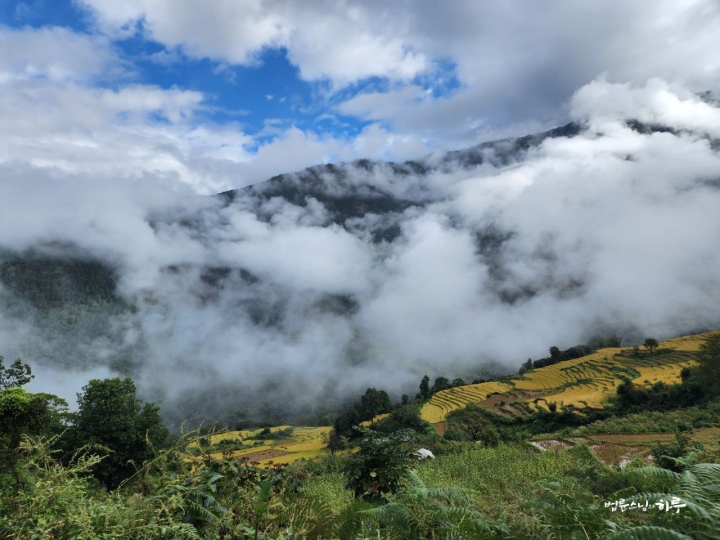
At 9:50 AM, they finally arrived at the newly built house in Bardo Chiwog and began the completion ceremony. This newly constructed house is home to an elderly couple. Before the house was built, a young nephew had been living with and caring for the elderly couple.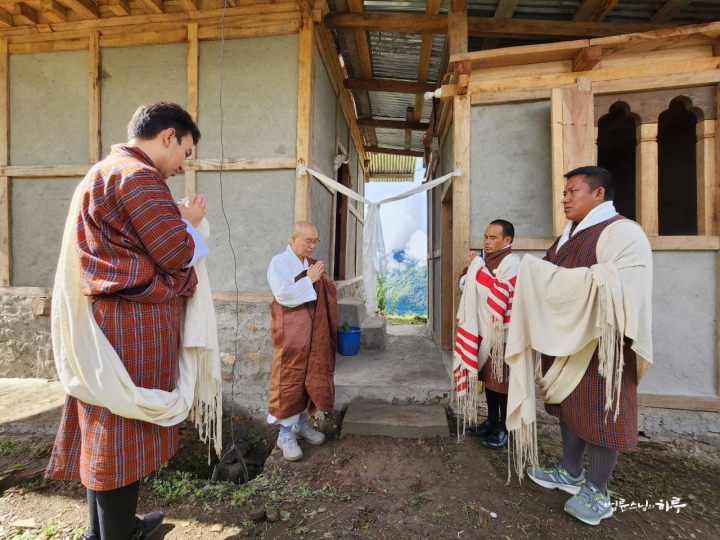
After conducting a blessing prayer ceremony for the new house, they untied the ribbon.
“One, two, three!”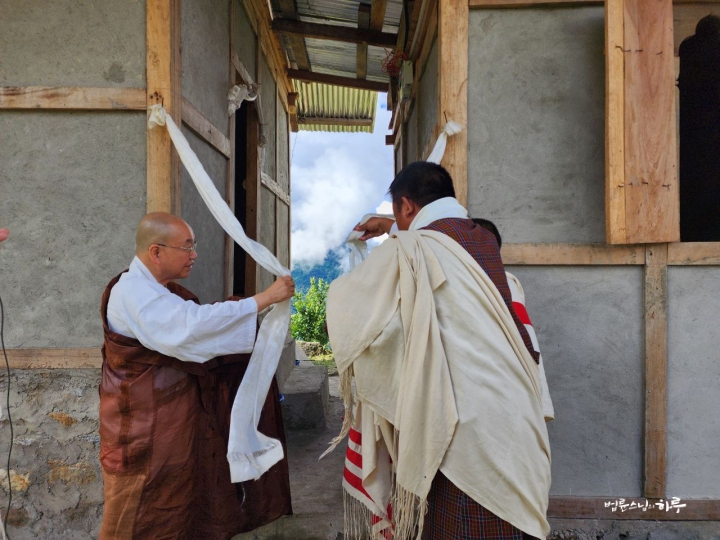
The elderly couple and all the JTS volunteers applauded with joy.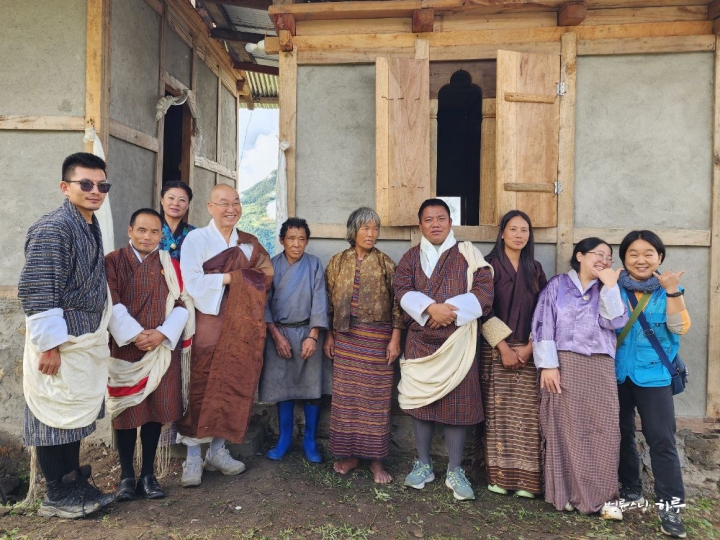
Sunim entered the house and carefully inspected every corner to ensure the construction was properly completed.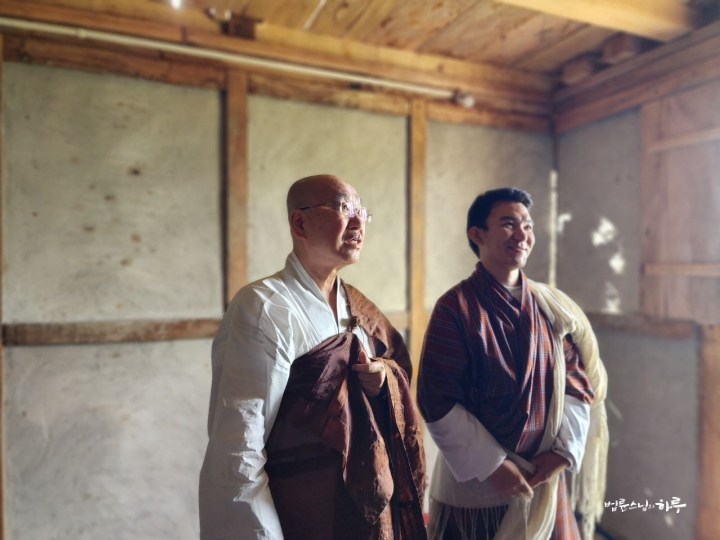
“I can see gaps in the walls here and there that need to be finished with cement plastering. In the future, it would be better to build houses after the wood has been sufficiently dried. Also, the toilet isn’t connected to water yet, so that connection work needs to be done.”
He also carefully explained to the carpenter who built the house what improvements needed to be made.
They then moved to the next house for another completion ceremony. When Sunim arrived, all the villagers of Bardo Chiwog had gathered to welcome him.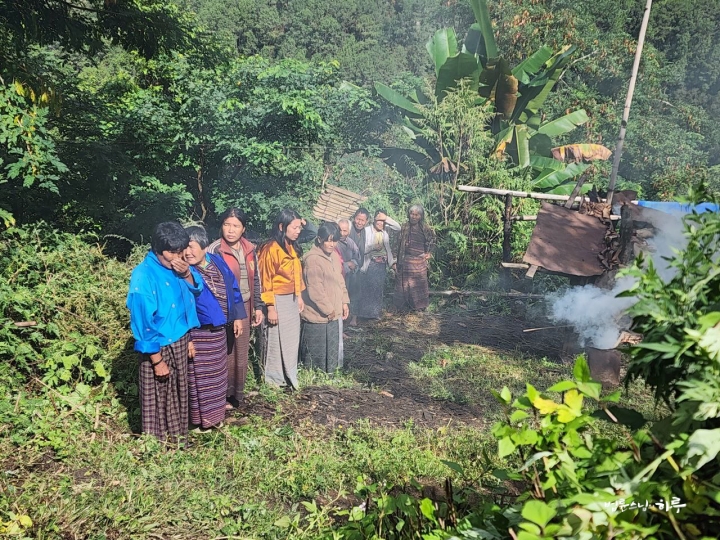
After the blessing prayer and ribbon cutting, they entered the house to inspect every corner.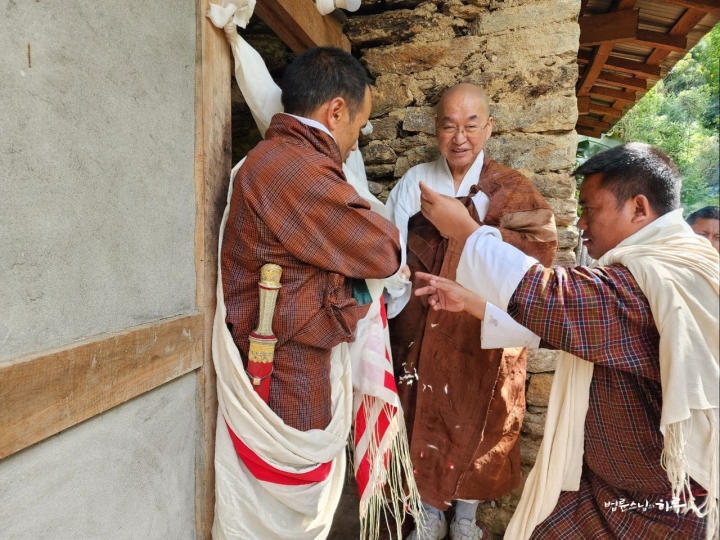
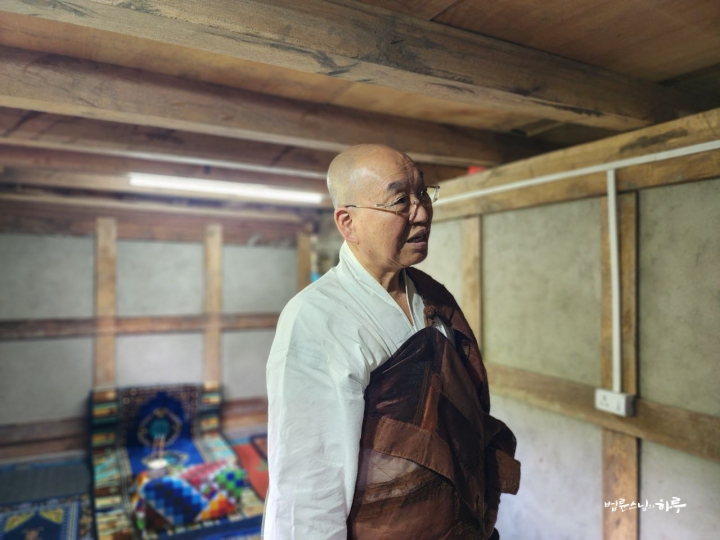
This house was built to provide a separate small space for a grandfather who had been living with relatives. They had agreed to only partially repair the main house, but upon visiting, they found the main house had been built almost like a new house.
Fifteen residents of Bardo Chiwog gathered to greet Sunim. Sunim began conversing with the residents with a smile.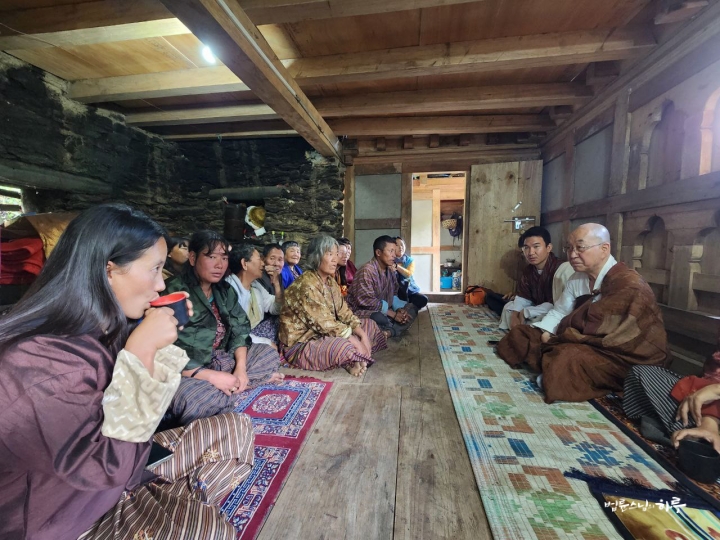
“Are you happy with the house repairs?”
“Yes, we are happy.”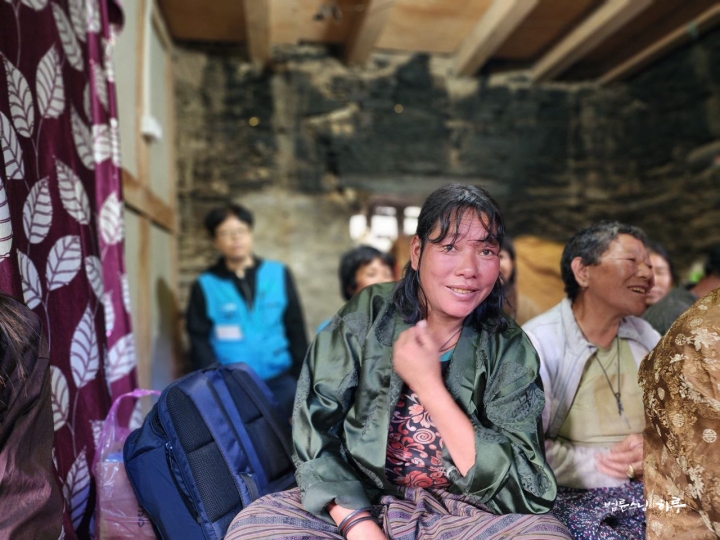
“Since you take good care of your elders, good things like this happen. These days, even children don’t take good care of their parents, but how wonderful it is to see a nephew looking after his elders like this. Looking at it now, it’s not just a repair but almost a completely new construction.”
“It’s thanks to your support, Sunim.”
“Even if it’s not your own house, doesn’t it feel good when a neighbor’s house is newly built? Did everyone go and help for several days?”
“Yes, most people helped for about 5 days. People from Komshar village also came down to work together. If we don’t help each other, relationships can become strained. So everyone contributed their efforts together.”
“Grandmother, how do you feel about having a new house?”
“I’m truly grateful. No matter how hard we tried, we couldn’t afford to build a house ourselves. I’m sincerely thankful for this help.”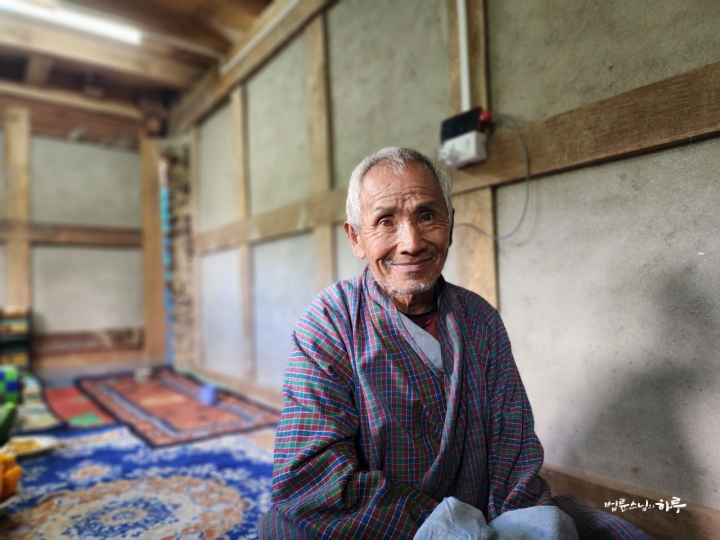
“You don’t need to thank me. The villagers and the Tshogpa worked hard, going back and forth many times.”
“It’s also thanks to you, Sunim, that these people could work together.”
After conversing with the Bardo Chiwog villagers, Sunim gave each resident a bar of soap as a gift.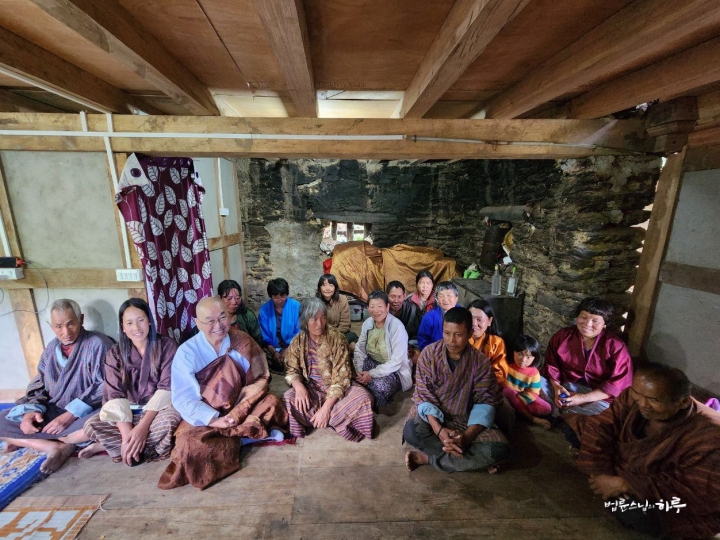
After taking a group photo, they had a meal with food carefully prepared by the residents. During the meal, they shared many stories about various episodes experienced during the house-building project with Bhutanese government officials.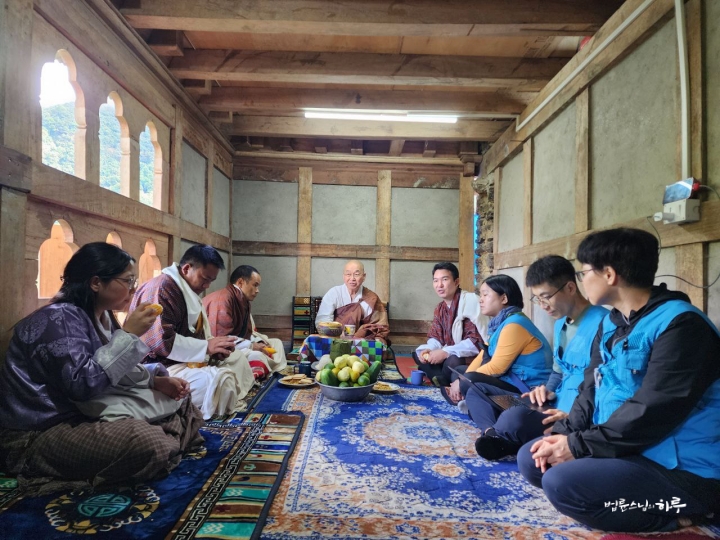
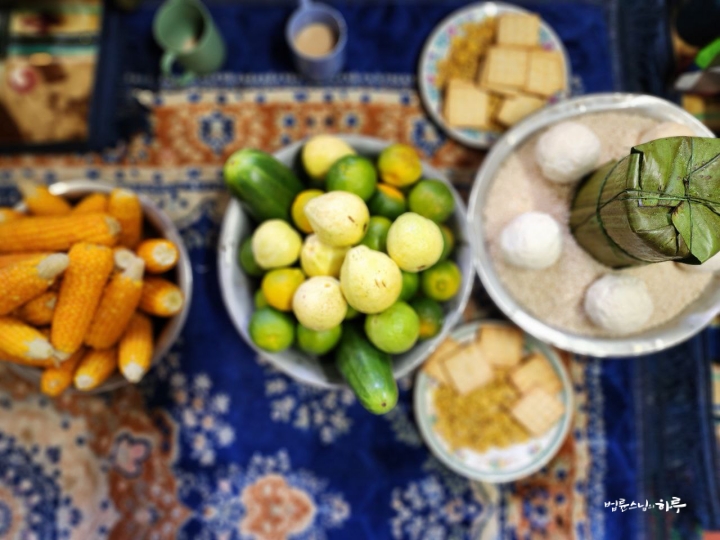
After finishing the meal, they departed for Komshar Chiwog at 11:30 AM.
After driving for 50 minutes on steep mountain roads, they arrived at Komshar Chiwog at 12:20 PM. As soon as they got out of the car, they first inspected the irrigation channel repair work.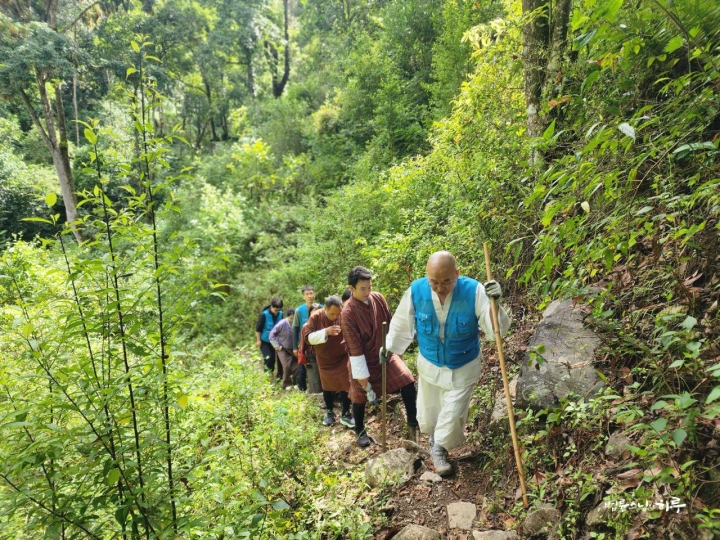
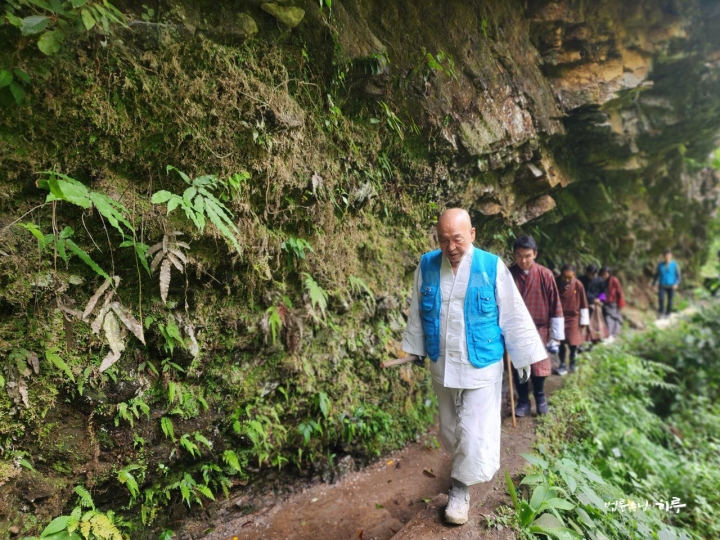
After walking about 2km along the winding mountain path following the channel, the water source appeared. During last year’s inspection, water couldn’t flow down because various parts of the channel were blocked, but after the repair work, water was flowing down very well. The residents had requested pipe support, but Sunim had suggested repairing and using the existing channel. Sunim asked the Tshogpa with a smile.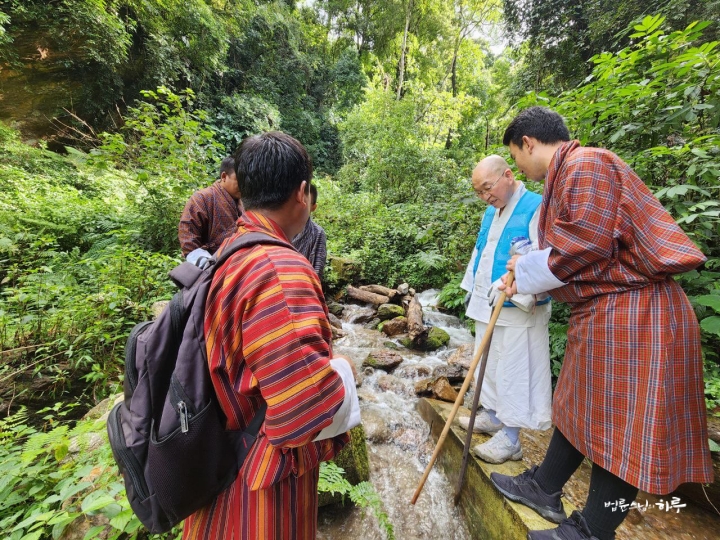
“How is it after repairing and using the channel?”
The Tshogpa answered with a satisfied smile.
“After repairing the irrigation channel, we have sufficient water. There used to be disputes among residents over water supply, but after the repair work, the disputes have been completely resolved. Thank you so much.”
“While having irrigation facilities is important, it’s even more important to inspect and maintain the channels before the monsoon season or on a regular basis. Especially when rocks or sand get washed down into the channels, water can overflow and cause landslides. That’s why advance inspection and maintenance are necessary.”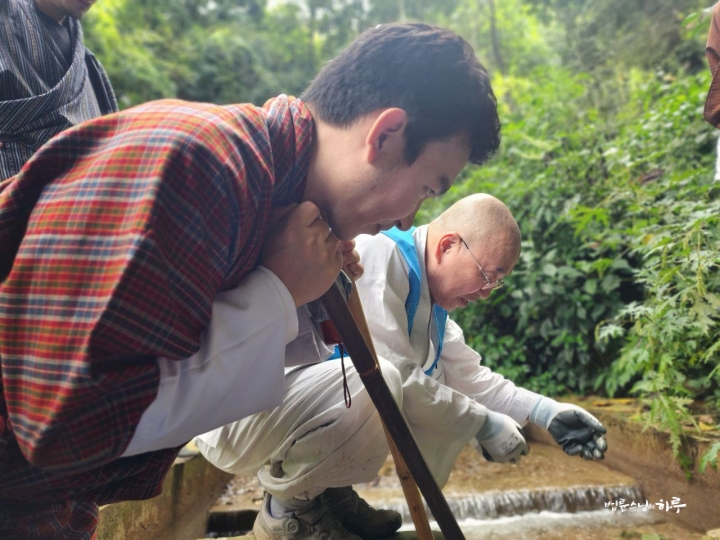
They walked back down the mountain path for about 50 minutes to reach the road. Sunim encouraged the Tshogpa for doing well and gave him prayer beads and soap as gifts.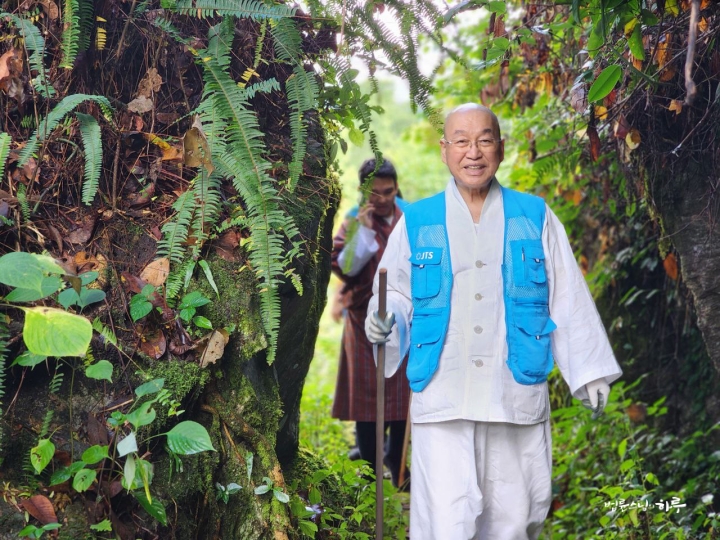
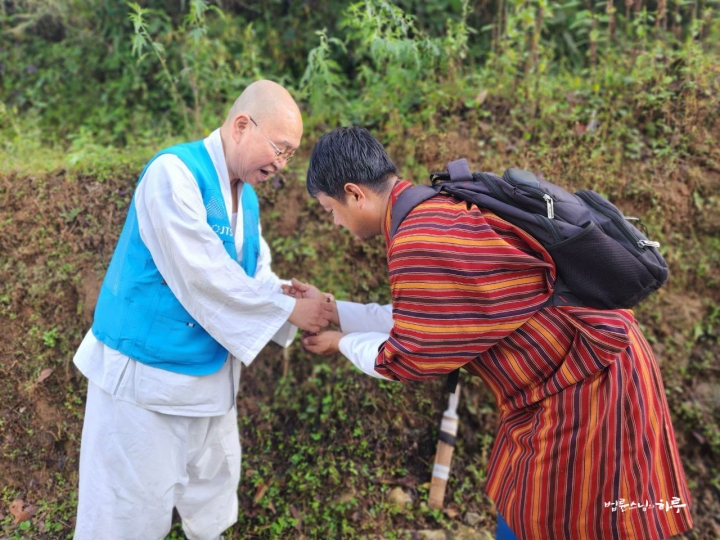
“There were more places that need repair in the middle, so please fix them right away. Since fallen leaves shouldn’t accumulate in the irrigation channels, make sure to clean them in spring. Let me know if you need anything.”
In Komshar Chiwog lives the family of Rinchen Dawa, who provides interpretation services whenever Sunim visits Bhutan. They met Rinchen Dawa’s family and exchanged brief greetings.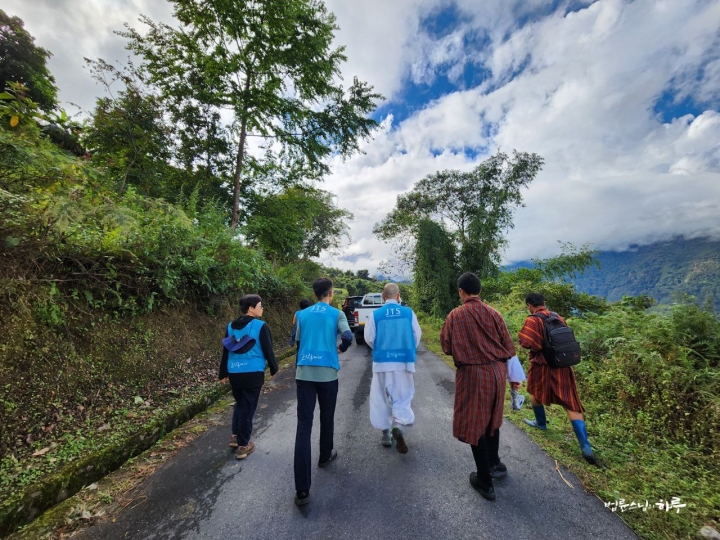
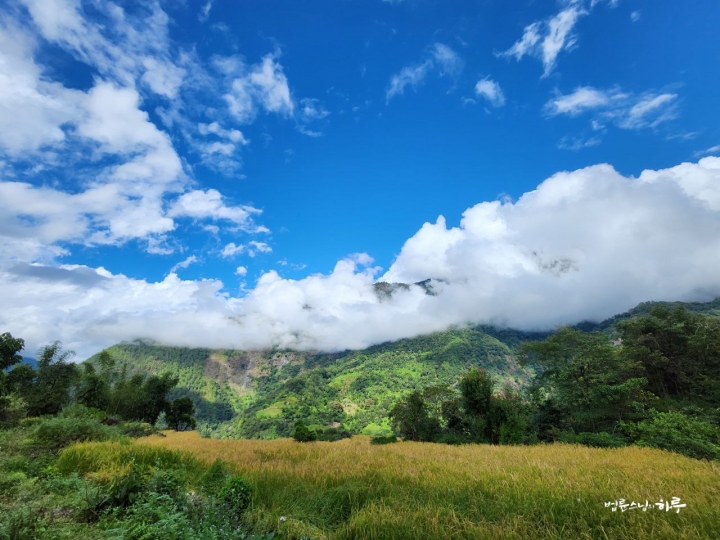
Rinchen Dawa’s parents gave Sunim rice and cheese as gifts. Sunim expressed both gratitude and apology to Rinchen Dawa’s family.
“I’m sorry that Rinchen Dawa came home after a long time, but I took him away immediately without giving you time to talk together.”
After taking a commemorative photo with the family, they departed from Komshar Chiwog at 1:30 PM heading for Langdelbi Chiwog.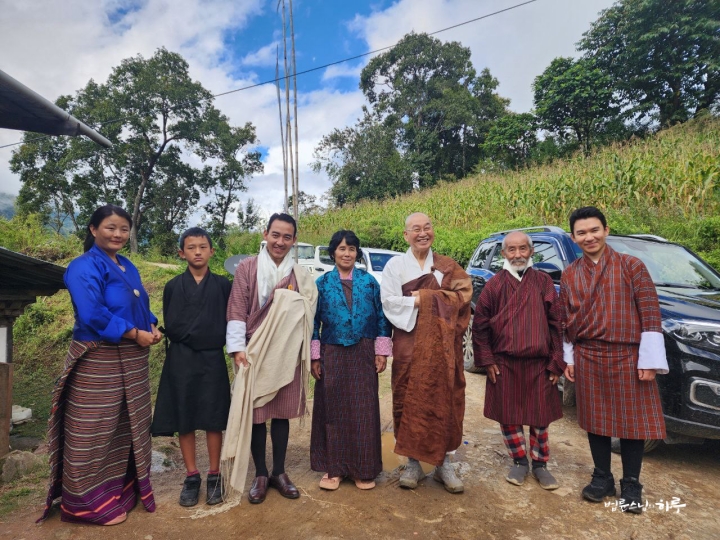
After driving for 1 hour and 20 minutes on winding mountain roads, they arrived at Langdelbi Chiwog at 2:50 PM. This was a particularly welcome place as it was where JTS volunteers had conducted their first house-building project last year.
They walked for quite a while, sweating on steep field paths that were even more severe than North Korea’s terraced fields.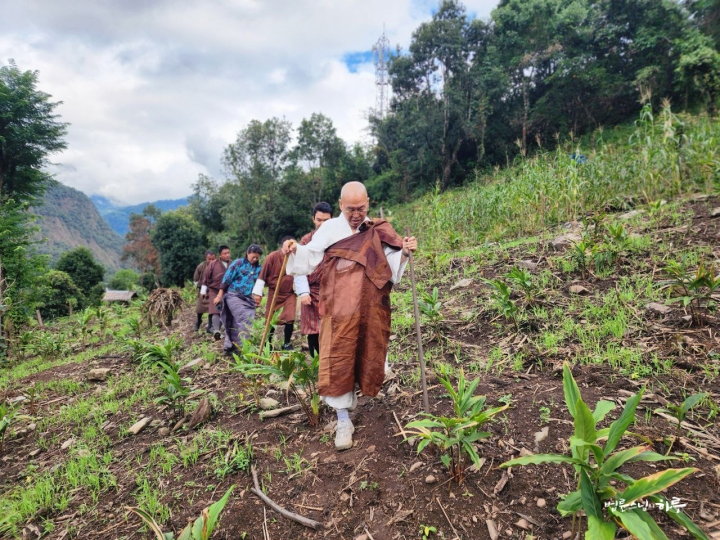
The house was located on a high hill, offering a beautiful view of the village below.
“The scenery is very beautiful.”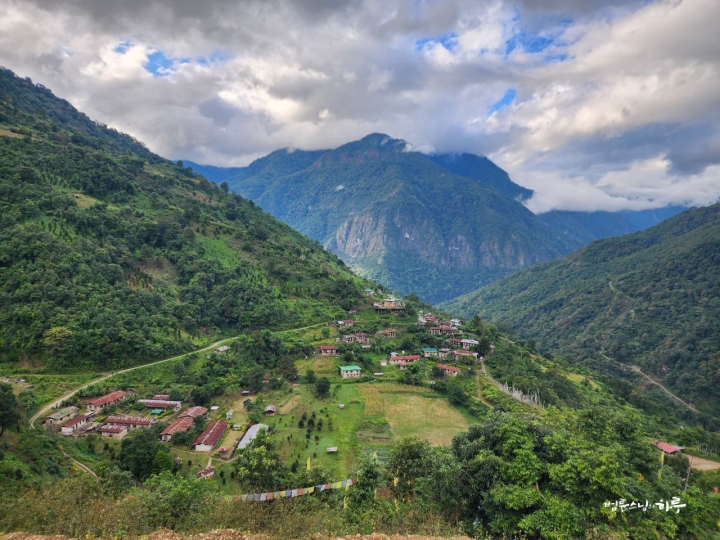
Since the old house was still standing, they could compare before and after the construction.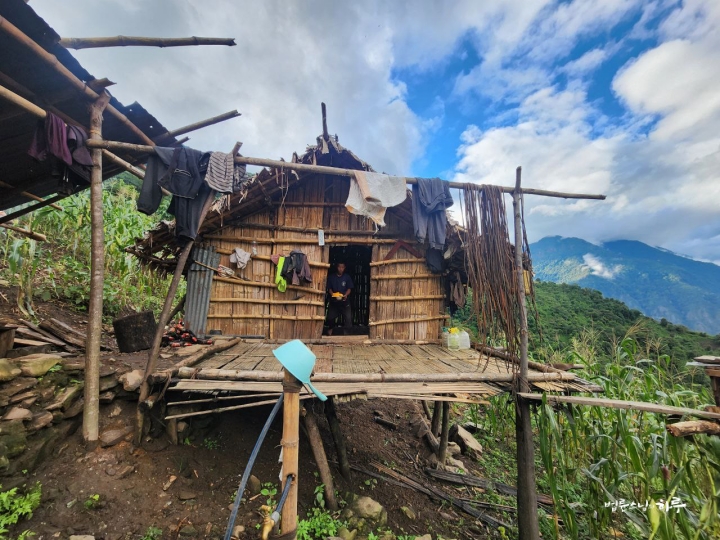
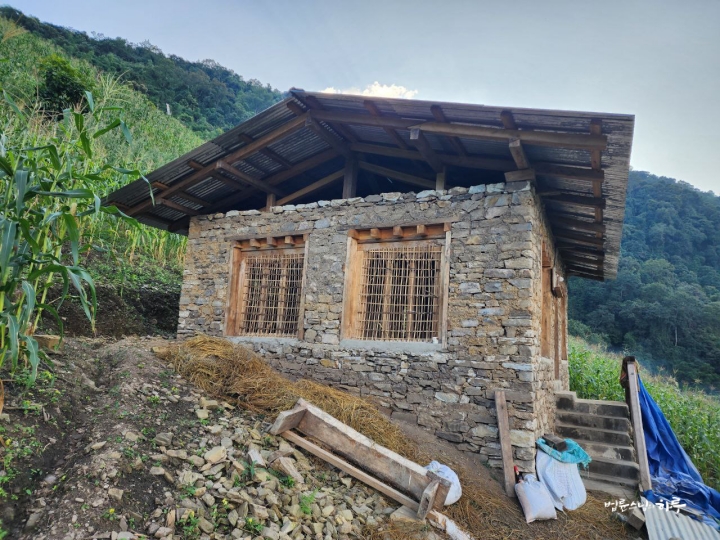
After comparing the old and new houses, they greeted the homeowner and walked back down the mountain path. On the way down, they briefly stopped to check the condition of a temple’s retaining wall, where villagers had requested support due to landslide risk behind the temple.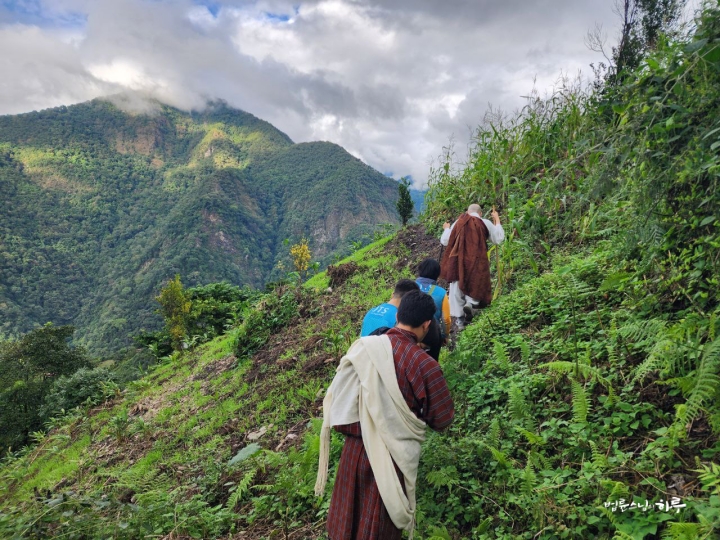
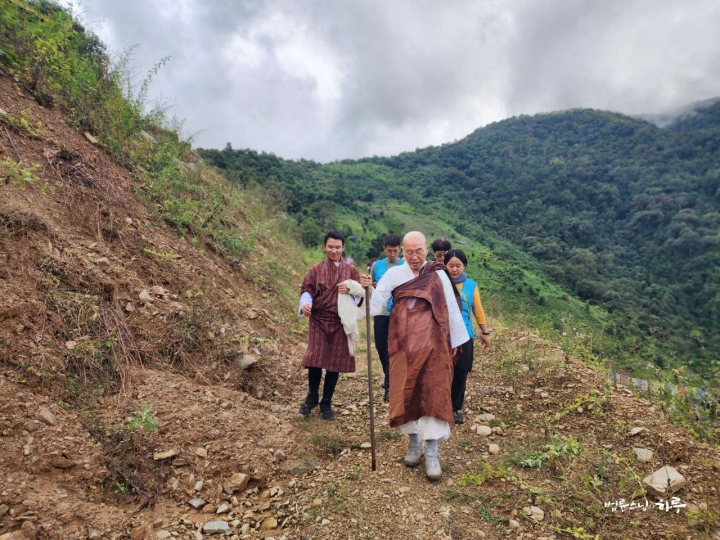
When they arrived at Langdelbi Elementary School, about 50 residents of Langdelbi Chiwog were waiting for Sunim. After greeting the residents, Sunim first directly confirmed how much the residents had participated in the house building. About 10 people had participated for more than 7 days, and most had participated for at least 1 day. Sunim encouraged the residents for their hard work.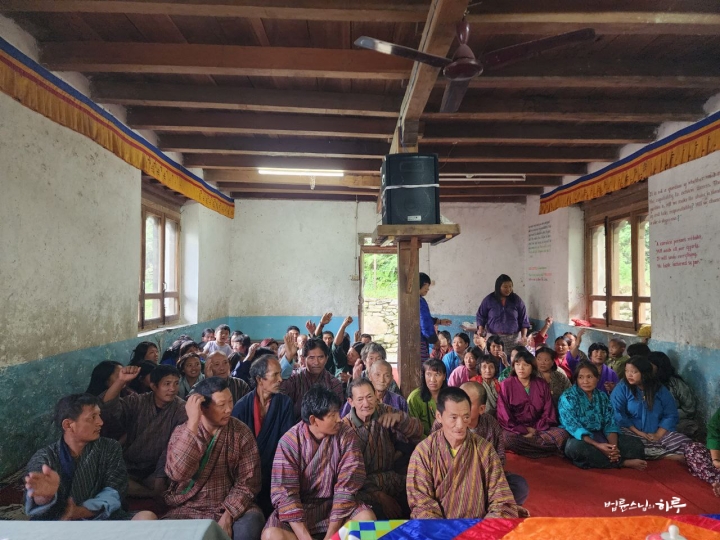
“Thank you all for your hard work. Aren’t you also happy to build a house together for someone without a home in the village?”
“Yes, we are happy.”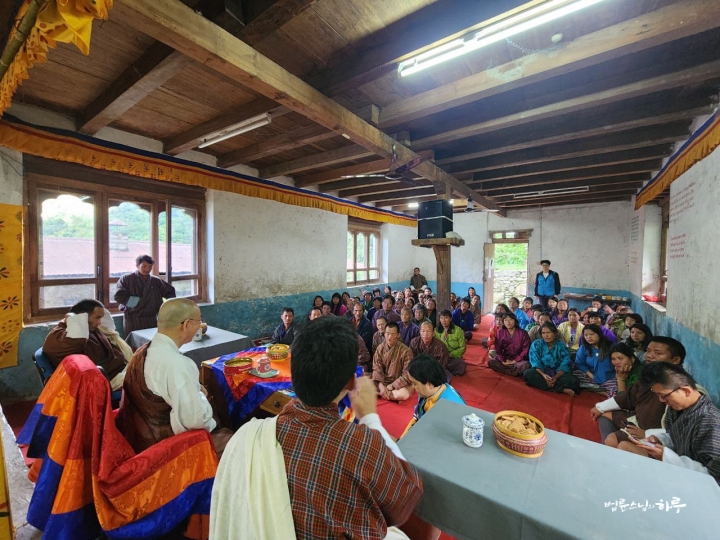
“Everyone actively participates in installing water systems or building roads because it benefits the entire village. But I understand that people might hesitate when it comes to building an individual’s house. Still, you are neighbors who have lived together here for a long time, so if you think about it, you’re all distant relatives. It’s not that they couldn’t build a house because they were lazy, but because they were poor, so it’s good that we help together.
Relieving Poverty Is Itself a Buddhist Act
Monks often build temples when they collect money. However, JTS believes that from the perspective of ‘people are Buddha,’ we should build people’s houses before temples. That’s why JTS provides materials needed to build houses for the homeless instead of building temples in Korea. So you should participate in this work not simply as building houses, but with the mindset of building a temple. On the evening before Buddha entered nirvana, Venerable Ananda asked Buddha.
‘We understand that making offerings to Buddha accumulates great merit. But when Buddha enters Nirvana, will we lose the opportunity to accumulate such great merit?’
Then Buddha replied. 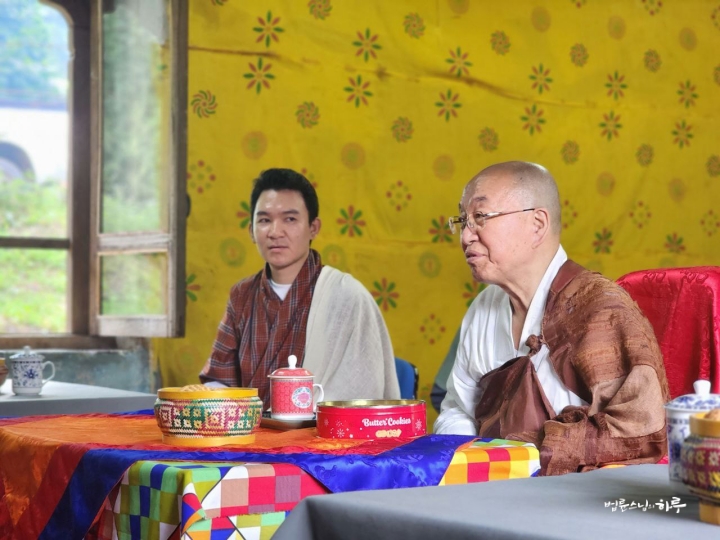
‘Ananda, do not worry. Even after the Tathagata enters nirvana, there are four ways to accumulate merit equal to making offerings to the Buddha. First, giving food to the hungry. Second, providing medicine or helping to treat the sick. Third, helping and comforting the poor and lonely. Fourth, supporting practitioners who practice purely. These four actions have the same merit as making offerings to the Buddha.’
That is why JTS practices these four meritorious deeds that are offered to the Buddha rather than building new temples. Giving water to the thirsty, providing food to those without, treating the sick, building homes for the homeless, and establishing schools for children who couldn’t learn at the proper time – these are truly Buddhist works equivalent to building temples. What you are doing now is not building individual houses but performing Buddhist works. 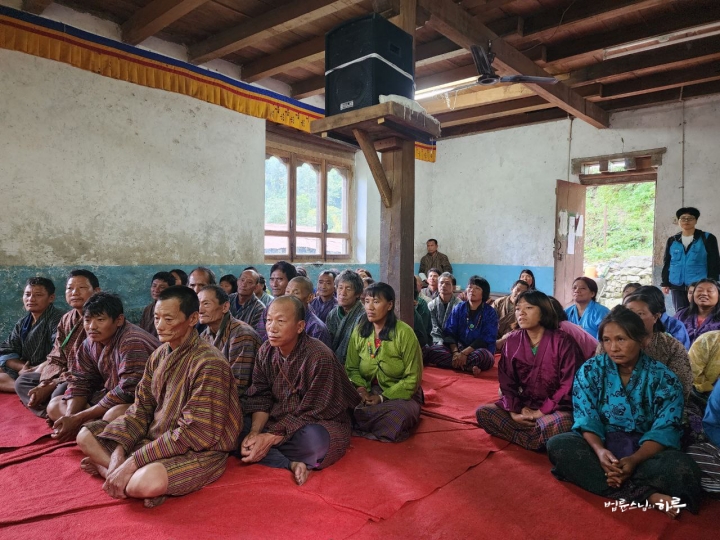
I heard that you promised to help before but couldn’t fully participate because you were busy. Now, when the corn and rice harvest is over, the winter farming off-season will come. Since there’s no farming then, instead of just drinking alcohol, participating in such good work together will bring great merit. Especially the residents of Langdolbi Chiwog seem to drink a lot. Wherever I go, I often see people who are drunk. So let’s reduce drinking a little, and during the farming off-season, let’s stop drinking and work together to build houses for neighbors without homes. This will bring great merit. Since ancient times, it has been said that building roads where there are none and digging wells where there is no water brings great merit. It’s written in the scriptures too.”
Then Sunim asked the Tshogpa.
“Are there still people without homes remaining in Langdolbi village?” 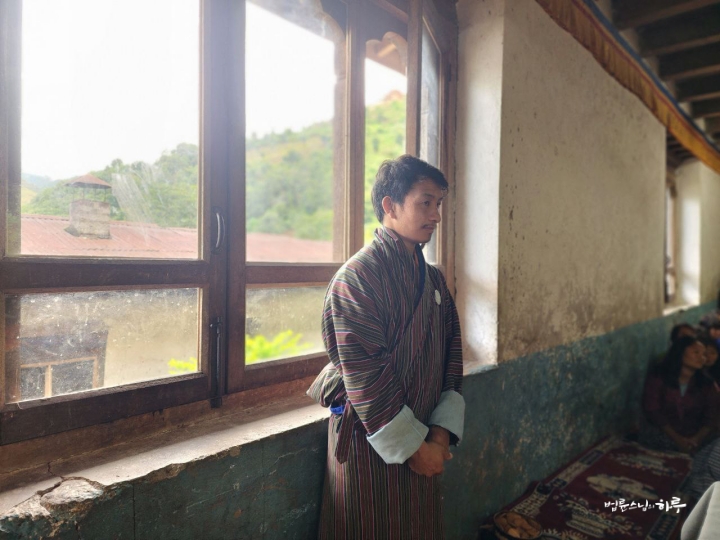
“There is one house that needs to be newly built and one house that still needs repairs.”
“Good. Will all of you help together?”
“Yes, we will help.”
“Good. All of you have worked very hard. As a token of appreciation, I’d like to give each of you a small gift of soap.”
After distributing gifts to all the residents, Sunim headed to the next house for the completion ceremony.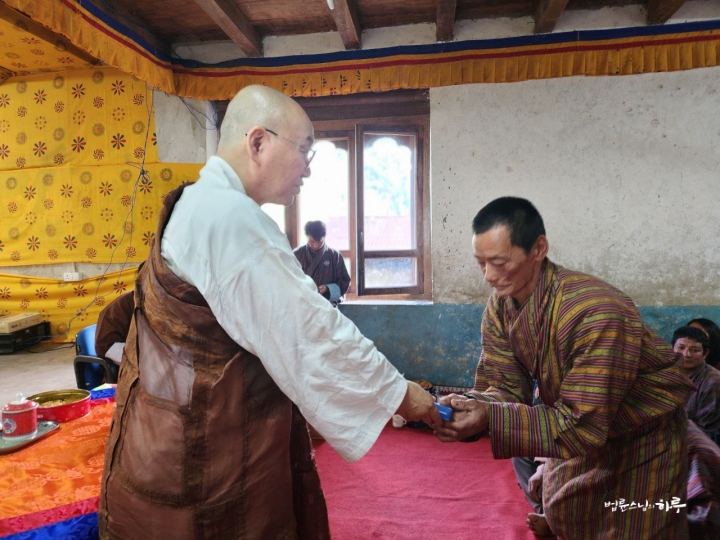
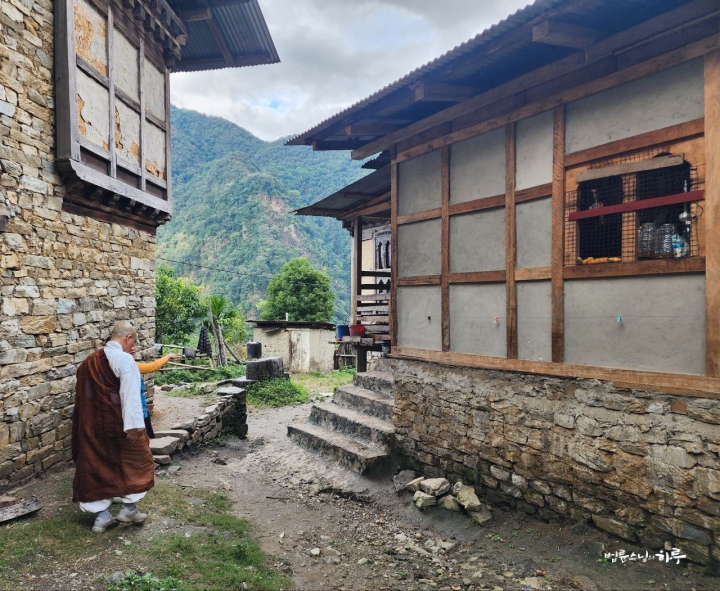
In this house, the grandfather had originally been living in a corner of the veranda in his nephew’s kitchen. So a partition was installed to create a separate space where the grandfather could stay comfortably.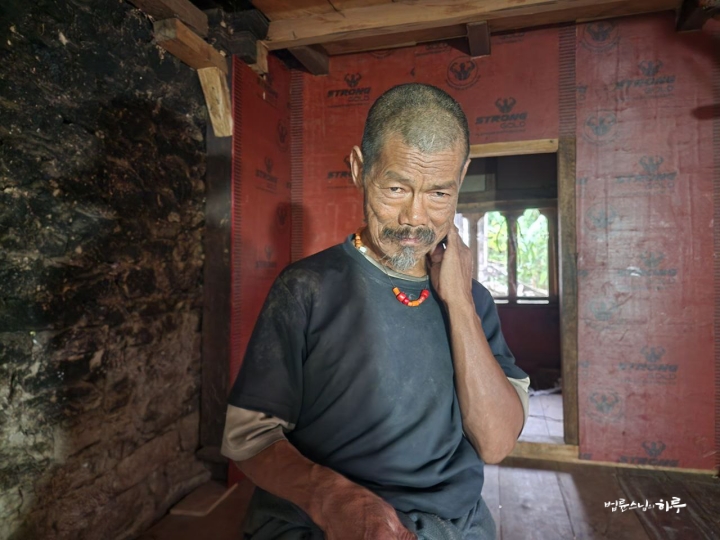
Although the grandfather is deaf and cannot speak, he was extremely happy and delighted. It is said that after the new space was prepared, he spends all day in that space. Sunim explained the grandfather’s story in detail to the Deputy Governor of Zhemgang before leaving the house.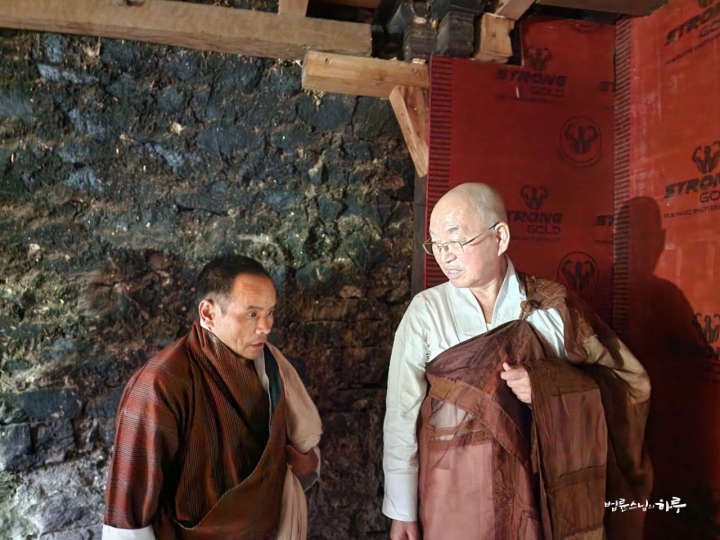
Sunim then headed to the next house for the completion ceremony. This house was newly built for a couple who had been living in one room of a relative’s house. Since the homeowner had injured his leg and was hospitalized at Thimphu Hospital, they couldn’t meet him and only visited the house. Instead, the carpenter in charge of construction explained the building process in detail.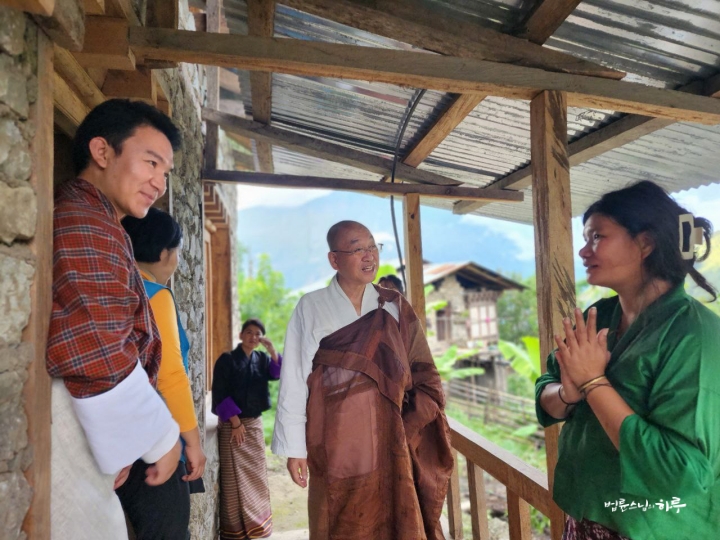
After telling the carpenter about additional repairs that needed to be made, Sunim left Langdurbi Chiwog and moved to the next location.
After driving along mountain roads for an hour, they arrived at Pantang Primary School in Pangkhar Gewog at 6 PM. The sun had set during the journey.
Pantang Primary School was a place that had requested repair work. Sunim carefully examined various areas where the repair work had been carried out.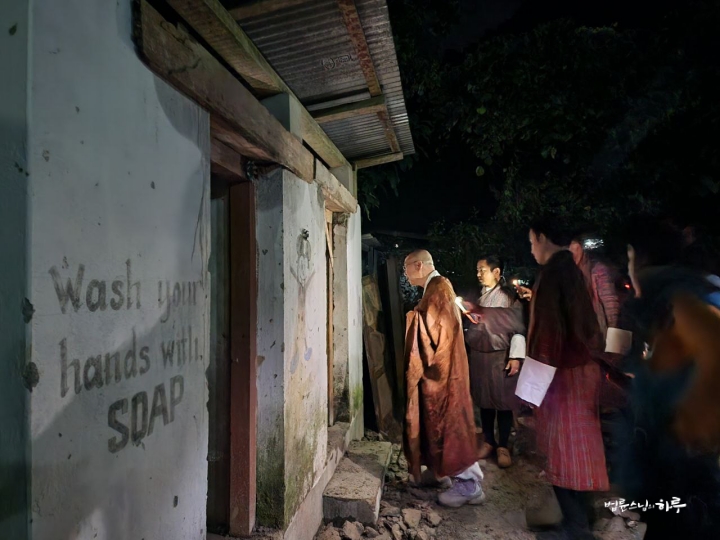
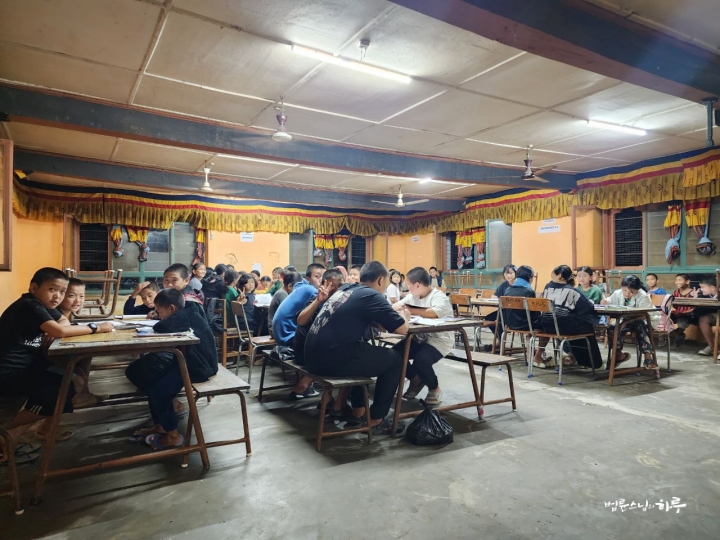
After touring the newly built toilets, reading room floor, dormitory toilets, path to the external toilets, and drainage system in order, Sunim asked the Tshogpa.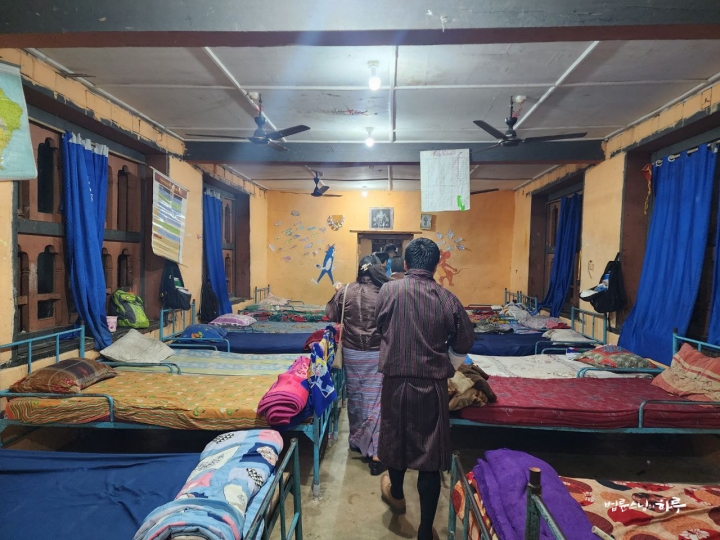
“Are the children happy after the repairs?”
“The children are very happy now that the path is no longer slippery.”
Sitting in the principal’s office and drinking tea, Sunim had a brief conversation with the teachers.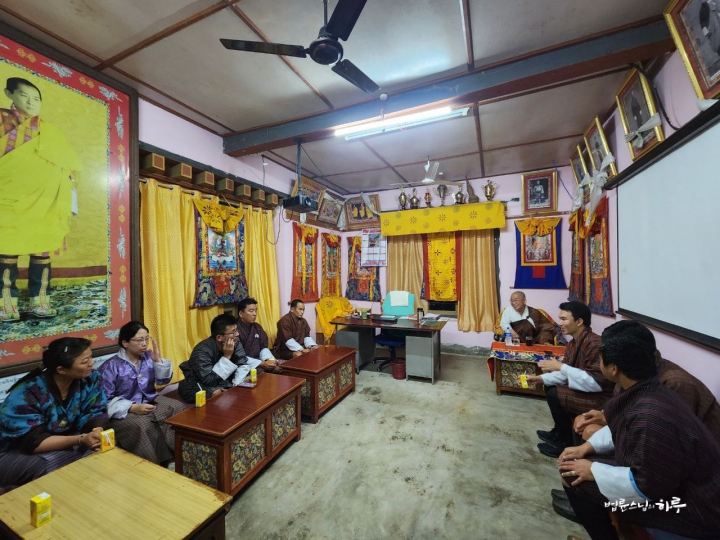
“Although JTS provided the materials, the school could be repaired like this thanks to the affection and interest shown by the Zhemgang Governor. Please be sure to express your gratitude when the Governor visits here next time.”
“No matter how much interest the Governor shows, this was only possible because of your support, Sunim.”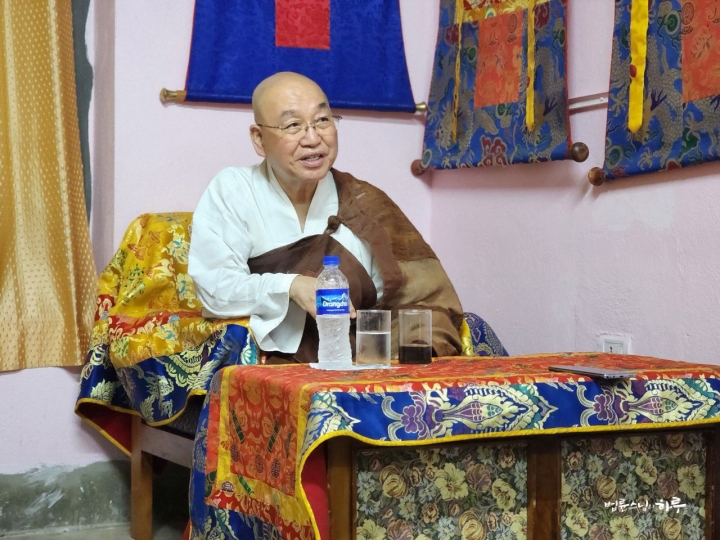
“Cleanliness management is most important for schools that children attend. While it’s necessary to have good facilities, what’s more important is to consistently maintain cleanliness. I once visited Yebilaptsa High School, and while it looked like a good school from the outside, the toilets were terribly dirty. While it’s important to educate children to use facilities cleanly, we must first properly build the toilet facilities. For example, when water is poured, it should drain immediately, but if water pools, it’s difficult for children to keep it clean no matter how much we tell them to. So we need to first improve the toilet facilities, and then train the children to develop clean habits. Traditionally, in Asian cultures including our country, toilets were considered dirty and were placed far from the house. They were generally used in an unclean manner. But nowadays, globally, there’s a culture of bringing toilets inside the house and using them as cleanly as kitchens. We need to instill this awareness in children too. Please feel free to request anything the school needs.”
“Thank you.”
While leaving the school, Sunim also briefly looked around the kitchen.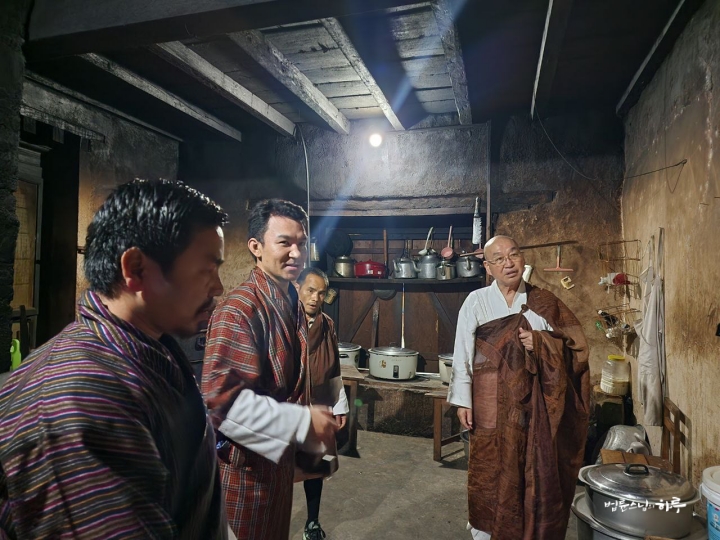
“Don’t you need anything else like shelves for organizing?”
“It’s fine. It’s planned as a government project.”
Leaving Pantang Primary School, they returned to the JTS Center at 6:30 PM. Dinner was planned to be shared with Zhemgang officials.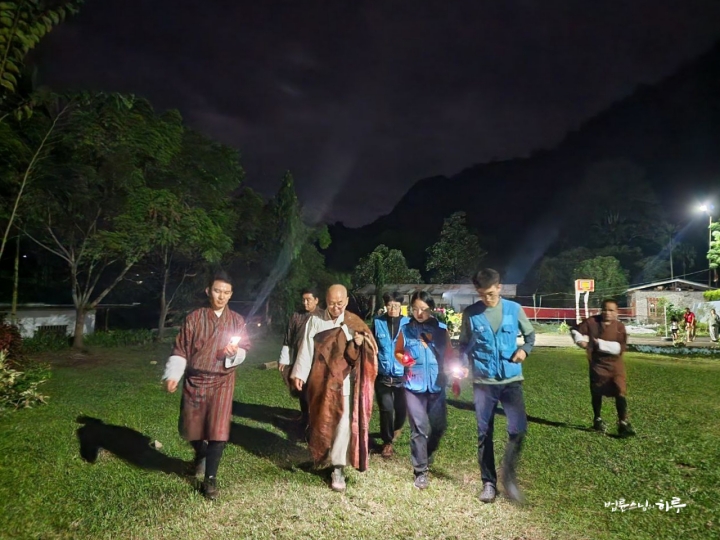
Three Korean JTS volunteers and two Indian volunteers had spent the entire day preparing the dining venue and food.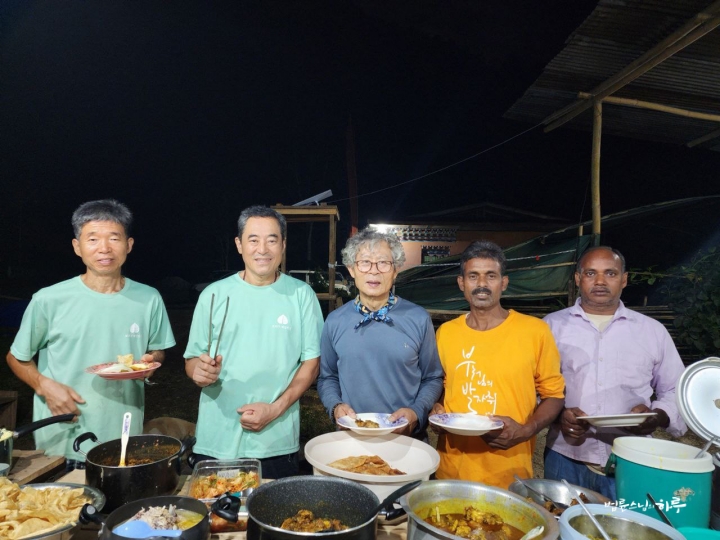
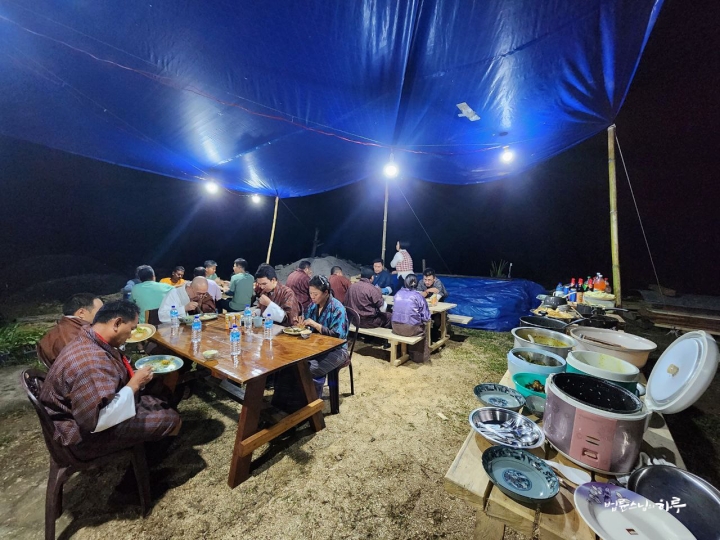
After the meal, Sunim introduced the JTS volunteers and Bhutanese officials and expressed his gratitude.
“This visit to Bhutan was rather short. I especially appreciate everyone’s hard work despite the heavy rain. Please give a big round of applause to everyone who worked hard.” 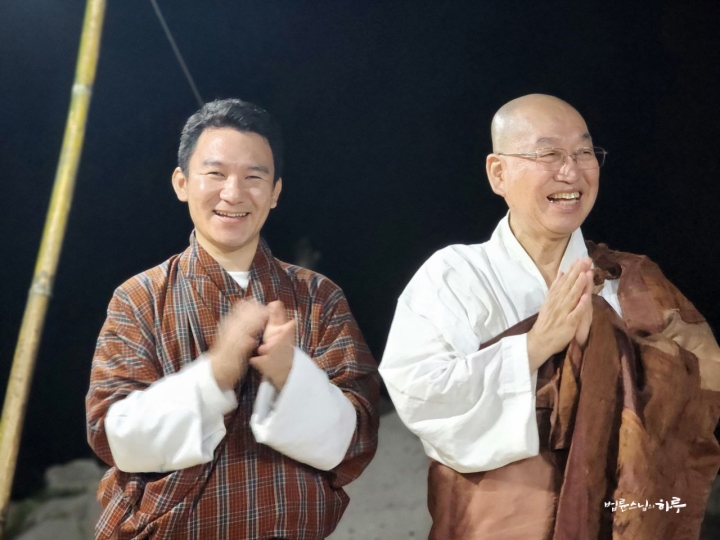
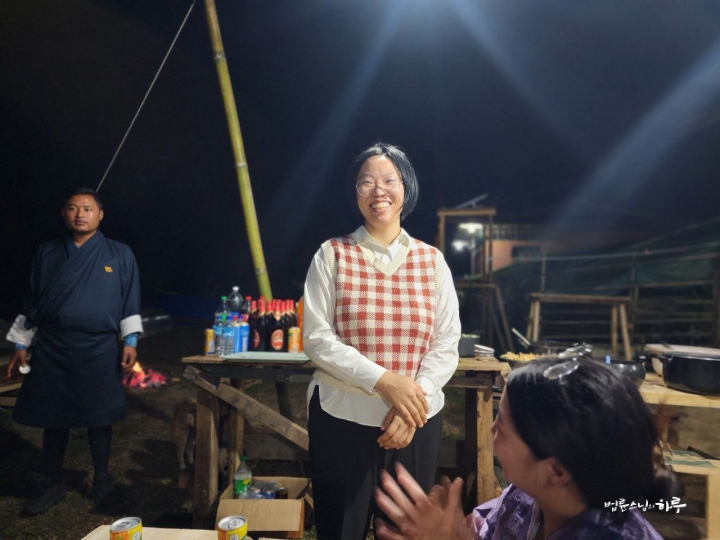
After encouraging each other with applause and cheers, Sunim continued speaking.
“Tomorrow morning, we plan to visit Nabji village in Korphu Gewog, Trongsa. There’s an issue with building a farm road there. Without a farm road, it’s very difficult to transport materials. However, building the road requires including parts of residents’ rice fields, and some people were reluctant to give up their land. So it took some time to negotiate. Fortunately, opinions between the Governor and residents have now been somewhat aligned, so we should be able to start construction this winter. Once the road is built, land prices will rise significantly, but residents are still only thinking about the area size, making persuasion difficult. Nabji village is also a Buddhist sacred site. So we need to think together about how to beautifully maintain the temple and how to develop the Buddhist sacred site from both perspectives. Would it be okay to depart at 5 AM tomorrow?”
“Yes.”
Sunim concluded the meeting after apologizing for the shortened visit schedule.
“Unfortunately, it seems we’ll have to end our Zhemgang visit here. The day after tomorrow, I must attend the ‘Prayer for Peace’ hosted by His Majesty the King of Bhutan, so I have to return to Thimphu urgently. I ask for your understanding once again regarding the schedule change.”
He then presented gifts to the Deputy Governor of Zhemgang, the Gup of Goshing Gewog, the Gup of Pangkhar Gewog, and everyone who participated in this visit.
After all the Bhutanese officials returned home, Sunim finished his day’s work by proofreading manuscripts and handling business at the JTS Center.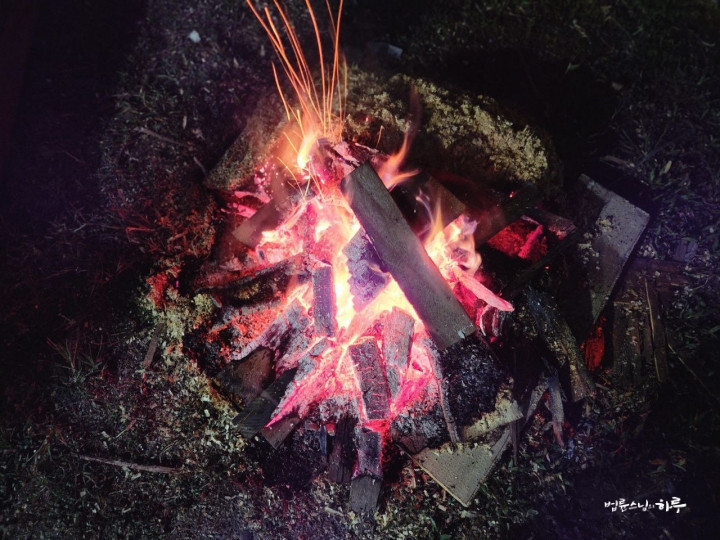
Tomorrow, Sunim will move to Trongsa in the morning to discuss the farm road issue in Nabji village, then travel to Thimphu for the entire day.





